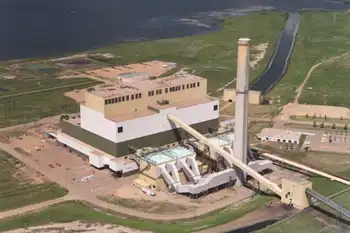VirginiaÂ’s electric power play
By The Washington Times
Arc Flash Training CSA Z462 - Electrical Safety Essentials
Our customized live online or in‑person group training can be delivered to your staff at your location.

- Live Online
- 6 hours Instructor-led
- Group Training Available
On top of all that, the law would end Virginia's experiment with retail electricity competition for all but the very largest customers.
Electricity markets have changed in unanticipated ways since legislators passed Virginia's original electricity restructuring legislation in 1999. That may be a good reason to revise regulation, but not to outlaw competition.
Virginia's 1999 legislation permitted consumers to buy electricity from any company licensed by the state to sell electricity. Utilities' electric rates were frozen until 2010, with some exceptions for fuel price increases.
The biggest utility, Dominion Virginia Power, could seek rate increases linked to increased fuel prices this July. The theory behind the legislation was that competition would gradually become strong enough that the utilities' prices could be deregulated.
But few competitors showed up. As in many states, Virginia's rate caps gave competitors little room to undercut incumbent utilities. Consumers got a break on rates, whether they bothered to shop around or not.
Consumers who switched paid the utility a "wires charge" calculated to give much of their savings to the utility.
As a result, only 1,300 residential customers bought electricity from someone other than their utility in 2006, according to the Virginia State Corporation Commission. These consumers paid extra to buy "green" power from a Pepco subsidiary.
Electricity prices in Virginia would have increased, regardless of what policymakers did this year. The cost of fuel and wholesale electricity prices have risen substantially since 1999. Given these cost increases, prices would have increased under the pre-1999 regulatory system, the current system, the new system in the Virginia legislation or even in a robust competitive market.
Fearing a backlash like that which occurred when rate caps expired in Maryland last year, legislators sought a way to moderate the inevitable rate increases. This year's legislation brings electric generation back under regulation and allows Virginia utilities to earn rates of return at least as great as those of other utilities in the Southeast.
Unfortunately, legislators threw the baby out with the bathwater. They did not have to abolish competition at the same time they reimposed rate regulation.
Granted, combining rate regulation with competition is a delicate balancing act. The state that comes closest to getting the balance right may be Texas, where utilities must offer electric service at a regulated price, called the "price to beat." This rate was set 6 percent below the rates consumers paid in 2002, but not frozen. Utilities can change this rate twice yearly to reflect changes in the natural gas price - a major fuel for electricity generation in Texas.
Off the record, decisionmakers who designed the Texas system say the price to beat incorporates a "dumbass tax": consumers who simply stick with the utility's service pay a regulated rate higher than if they shopped around. In other words, Texas tried to make electric competition work like competition in many normal markets, where those who pay attention and shop aggressively usually get better deals.
In 2006, the PUC concluded retail electric rates would have been higher if competition had not been introduced. But price savings are not the only benefit. A March 2007 study by economist Robert J. Michaels for the Texas Public Policy Foundation notes, "Texas' proliferation of rate plans tell us that consumers value more than just low prices, depending on their risk aversion, environmental awareness, desire for electricity-related services and economic expectations."
Some critics say competition does not work well in Texas because about 50 percent of consumers still pay the "price to beat" rate. But there's little likelihood Texas will turn back the clock; regulators there seem more focused on increasing competition to solve any remaining problems.
The Texas example demonstrates state policymakers can protect consumers from monopoly pricing while still preserving their freedom to choose electricity suppliers.
Virginia could still preserve competition despite this year's legislation. Under the new law, retail competition disappears at the end of 2008. So the General Assembly gets another opportunity next year to revisit the electricity issue in a more careful and public way. Pegging regulated rates to wholesale electricity costs and preserving the competitive option could be a good way do deal with criticisms that this year's legislation gave too much to the incumbent utilities.
Interestingly, a poll of likely Virginia voters commissioned by an energy marketer found 85 percent want to retain their option to choose their electricity supplier, and 66 percent want to see more competition in the state. Even though they've seen little benefit from competition thus far, Virginians want more of it, not less.











